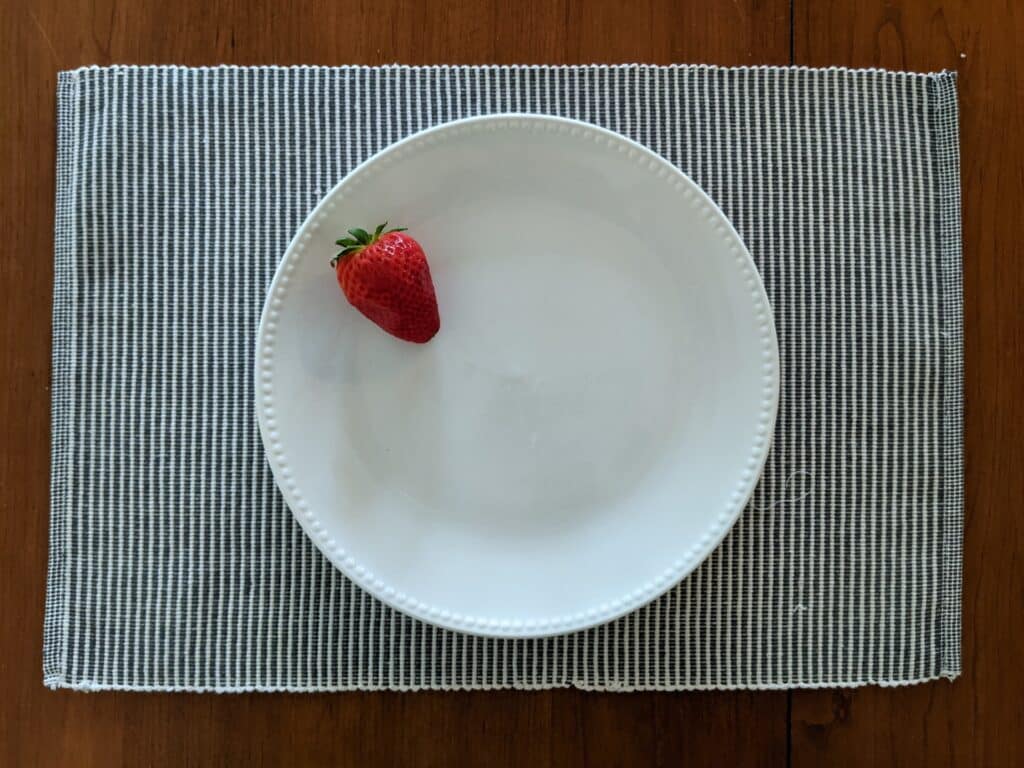This post may contain affiliate links. Please read our disclosure policy.
Wondering if the Optavia diet is too good to be true? Are people really saying “Optavia ruined my life”?
This weight loss program offers some compelling before and after photos that might make you want to sign up…but what is it actually like to be on this diet program?
In this article, I’ll give you a full Optavia review. Hi, I’m Jamie, a Registered Dietitian and nutrition expert. This article discusses what you might expect if you were to try this restrictive diet program and experience.
Let’s start this blog post with a quick overview of what Optavia is and then we’ll dive into the details about what research backs up this program.

What is Optavia?
Optavia is a weight loss program that promises to help people achieve their health goals through a combination of purchased, small pre-packaged meals and homemade “lean and green” meals.
Optavia is a meal kit plan with the goal of helping you to lose weight – fast! I know how tempting that sounds when you’re on a weight loss journey.
The program has become increasingly popular in recent years, with many proponents claiming dramatic results.
Following this diet plan, you’ll eat 5 small meals a day, every two to three hours, mostly from the products in your subscription box.
And then, you’ll have what Optavia calls a “lean and green” meal. A lean and green meal is something that you prepare (vs. eating the meals that came in the mail). The app provides recipes and you’ll make a low-carb meal that is protein-rich.
But what are the unspoken consequences of following Optavia’s strict dieting protocols?
How does Optavia work?
Optavia is a calorie-restricted program that will easily put most people into a calorie deficit. So, chances are you’ll lose weight if you stick with it. That’s because calorie restriction does work.
But will the weight loss last? The unfortunate truth: rapid weight loss through highly restrictive diets and ultra low calorie intake isn’t sustainable, and will usually result in weight gain over time, not weight loss. Let’s get into the details of the program.
For this review I’ll be talking mostly about their most popular plan, the 5 & 1 plan. They have several other plans as well that vary in terms of how many calories you’re allowed per day.
Low calorie; higher protein
The signature program that Optavia offers is a low-calorie program with only 800-1000 calories per day to kick off your rapid weight loss. The portion-controlled meals (called “fuelings” in Optavia-speak) are relatively higher in protein and lower in carbohydrates and fat.
Optavia Fuelings
In their most popular Optimal Weight 5 & 1 Plan, you’re allowed six small meals per day (and calling them meals is a stretch), five of those being “fuelings” that are expected to be eaten every 2-3 hours.
Optavia meals, aka “fuelings” are pre-packaged portion-controlled meal replacements that you purchase directly from Optavia. Examples include:
- Bars
- Shakes
- Soup
- Pancakes and cereal
- Mashed potatoes and mac and cheese
- Hot chocolate
Using these “fuelings” likely means that you will be eating much, much different from the rest of your family.
“Lean and Green” meals
On the 5 & 1 Optavia plan, you’re allowed one “lean and green” meal each day. This is a meal that you’re expected to prepare yourself that includes 5 to 7 ounces of lean protein, three ½ cup servings of non-starchy vegetables and up to two servings of healthy fats.
For example, 5 ounces of chicken breast with 1.5 cups of broccoli would be considered a “lean and green meal”.
Optavia coaches
Optavia is proud of their coaches, touting on their website that they know what you’re going through, because 90% of them are Optavia clients themselves.
The red flag here: Anyone can become an Optavia coach. You don’t need any education, background, or experience in nutrition or health.
On the Optavia site, they mention how study after study says that coaching helps you to lose weight. The study that the site talks about backs up the power of working with Registered Dietitians like me, aka, actual health professionals. However, the vast majority of their coaches are NOT licensed medical professionals by any stretch of the imagination (1, 2)!
Most of their coaches are just regular people who have done the diet themselves. And PS- Optavia coaches make money when they get more people to sign up for Optavia, because it’s a multilevel marketing company. The red flags are waving.
Hydration
In addition to the above meals, the Optavia system recommends 64 ounces of water each day (3).

Potential downsides
With any diet that’s extremely low in calories, you can actually become malnourished. It’s pretty difficult to get the essential nutrients you need on a daily basis like vitamins, minerals, and protein when you’re on such a low calorie diet.
To give you an example of just how low some recommended Optavia calories are, a 40 year old female who is 5’7”, weighs 200 lbs and lightly active needs over 2200 calories per day to maintain their weight. Optavia’s program allows you 800-1000 calories per day on the 5 & 1 plan.
Following any diet program that’s so low in calories can potentially lead to unwanted side effects. Side effects of eating too few calories over time include:
- Low energy levels
- Nutrient deficiencies
- Hair loss
- Muscle loss
Unfortunately, side effects don’t seem to be super uncommon. If you do some internet sleuthing you can easily find many anecdotal accounts from a lot of people who experienced major side effects from following Optavia.
Is weight regain possible?
Another consequence of any very low calorie program like Optavia is that it can be difficult to maintain your weight loss long term once you follow the program.
Again, if you do a bit of internet searching you can find countless anecdotal accounts of people who tried this diet program only to find they gained back the weight almost immediately, and some even gain more than what they started with.
This is a common occurrence of any restrictive diet program. When you’re finally eating enough calories, it’s hard to maintain weight loss because it wasn’t done in a sustainable way. Eating too little calories for too long can also impact our metabolism negatively over time.
Following any very low-calorie, restrictive diet can also fuel disordered eating and increase your risk of (or exacerbate) an eating disorder (5).
Optavia cost per month
You might be wondering: what’s the cost of Optavia? It’s quite a price commitment; each month will cost $400 or more, depending on which plan you choose.
If you have extra money to invest in your health, those $400 each month could be used to support long-term, sustainable habit changes. Things like buying more nutritious whole foods, joining a gym, or buying some home workout equipment to support your overall health.
Is there any research to support Optavia?
Yes, there are some clinical studies that investigate the Optavia weight-loss program (formerly known as Medifast) (6).
The studies report how effective the program is for the participants to lose weight, and what other symptoms they experienced. They also looked at things like how much muscle mass was lost (or not) following this very low-calorie program.
It’s worth noting that these studies are usually funded by the company themselves. Most of the studies were for 12 weeks. And yes, they did show weight loss.
But – and this is the most important part – that’s about as long as the people were followed. Most of us can follow a restrictive diet program for a few weeks or even months. What matters most is what happens after the “honeymoon” phase of the diet is over.
A 12-week study doesn’t tell us much about the sustainability of a diet program. To show that such a restrictive program is helpful, and not harmful, participants should be followed for several months at a minimum, and years following.
Especially since there are so many anecdotal accounts of people following this program and then regaining weight quickly. And yes, there are many anecdotal accounts of people claiming Optavia “ruined my life” as well.
Anecdotal accounts
You can easily find personal testimonies from former Optavia clients, saying that the program wasn’t a good fit, such as this one and this one.
What I appreciate about these two reviews is that they’re written long after starting the diet, after having been on (and then stopped) being on the diet plan. They have a pretty different feel than someone writing about their experiences when they’ve just begun and have more enthusiasm than experience doing the program.
There are also countless Reddit threads.
A dietitian’s thoughts
The Optavia program appears to be highly regimented and highly restrictive; these are both red flags for me.
If your “healthy” diet interferes with your ability to be flexible, travel, and spend time with your friends and family, it isn’t actually healthy.
If your “healthy” diet causes you to rapidly lose weight…and then you gain it right back, it isn’t healthy.
If your “healthy” diet depends on following an expensive program instead of teaching you skills to cultivate true health in a flexible and enjoyable way, it isn’t healthy.
And if your “healthy” diet puts you at risk of disordered eating or malnutrition, it also isn’t healthy.
The bottom line? Rapid weight loss with any highly restrictive plan isn’t what I would recommend for most people; the potential cons far outweigh the benefits.
More reviews
Ready to hear my thoughts on other diet plans and fad foods? I have a few more for you to check out!
- Debunking Enzyme Coffee for Weight Loss: Does it Help?
- Is Celsius Bad for You? The Truth from a Dietitian
- Is an Animal-Based Diet Healthy? An RD Weighs In
- AG1 Athletic Greens Review from a Dietitian
That’s a wrap
If you follow Optavia, you will likely lose weight. But like any very low calorie diet, there is potential that you’ll gain it all back quite quickly when you stop following it.
Simply put- I don’t recommend it. It’s restrictive and likely to be quite difficult to maintain
In my professional opinion, if you have weight loss goals learning how to build healthy, sustainable eating habits and lifestyle change with food and exercise is key for sustained weight management for life.
If you’d like to begin learning how to do just that without rigid diet programs, check out my Balanced Basics Handbook! In this ebook I walk you through exactly what you need to do to stard building healthy habits in a balanced way, step-by-step.
I hope this article helped break down some myths about Optavia and encouraged further research about any dietary supplementation/program before embarking on it.
Is there another diet or healthy eating method you’d like me to review? Comment below!














Optavia ruined my metabolism. I became so unhealthy in a few months. It took about 3 years to re adjust. I wish I could warn everyone about this horrible decision I made when I was onbthe optavia plan.
Optavia….where to start….coach was sounding like my best friend until I quit. I gave this 2 chances. After 4 weeks in, I was in the worst pain ever. Soy really messed up my gut. The coach didn’t seem surprised. Then after healing, tried the “soy free” products only to be told they also have soy.
Do not waste your money! I was even asked if I wanted to be a coach 3 weeks in….that boggled my mind. All in all. We are in control of our weight, just love and accept yourself n
Thank you for the honest information, truly appreciated the truth!! I was thinking about it but after reading all this information, I definetely changed my mind.
I agree with the above comments. Very similar experiences. I lost energy and muscle. For the first time in my life I struggled rearranging furniture in my house! My friends thought I had cancer and was on chemo-thats how awful I felt. I lost 40+ lbs in 3 months-not healthy!! I was also asked to be a coach a month in. Coaches get even more $ if their clients start coaching. My coach has been on this plan longer than me and she still eats the feelings every day. Once you’re on it you can never go off. It’s been 6 years and I am 15lbs heavier than when I started, have gall stones, lost a LOT of hair, have a thyroid module (from the soy diet)
Similar experience here. Lost 30+ pounds in 3 months, but developed a very painful situation in my intestines that needed antibiotics. My gallbladder also shut down and needed to be removed. My metabolism and digestive system has never fully recovered and this was almost 6 years ago. It’s also concerning that these “coaches” are continuously going on and off the 5&1 plan themselves, yet they try and sell it as a one-time program that eases you into a long term healthier lifestyle.
Don’t do it. I lost my hair, my blood pressure fell to 80/60, I became anemic and had no energy. Lose the weight eating vegetables, fruits and lean protein. I gained back every ounce and then some once I was off the program. Not sustainable.
I am in the process of going off this OPTAVIA diet plan. I throw up everything
“Normal “ I eat! I eat in small amounts… I can’t eat any seeds, lettuce, bread, so many things!!!! I can’t eat drink water… but only water! I’ve been off the diet for 6 weeks and my stomach does not digest. I have horrible left side ach pain. I’ve been with doctors… no answers.i knew NOT to jump into regular foods or large amounts of food right off the bat. I still do not want to do that. The stomach has shrunk. I’ve lost 60 pounds. I don’t recommend this diet.
Yes you can lose the weight, fast……but you can’t keep it off without spending $300-$400 a month to do it! I never had any luck with a coach either…..when I started a friend of mine was my coach and helped me to get started…..he stopped coaching and then I was assigned a coach like 3 years ago…..she has never once contacted me……I think I placed my last Optavia order……I’ll go back to Weight Watchers….at least you can have real food.!